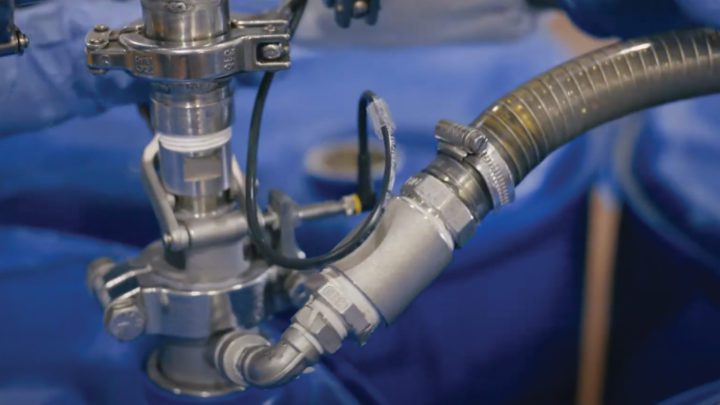
In its most simple form ‘circular economy’ describes a regenerative economic system, where efficient use of raw materials is maximised, energy is harnessed from renewable sources and the reuse and recycling of materials at the end of their useful life are prioritised.
The EU Commission has adopted this term as the name of its ambitious directive 2018/852, which outlines a number of targets to reduce the amount of waste sent to landfill over the coming years, not least that a minimum of 70 percent by weight of all packaging must be recycled by 2030.

To achieve these targets, the EU Circular Economy strives to “close the loop” of product lifecycles through greater recycling and re-use for the benefit of both the environment and the economy. The aim is to extract the maximum value and use from all raw materials, products and waste, thereby generating energy savings and reducing greenhouse gas emissions.
This is relevant to the industrial chemicals market, because a very high proportion of companies in the worldwide chemical industry, from manufacturers to end users, handle chemicals in single trip metal or plastic packaging. This packaging not only creates massive amounts of unnecessary waste, but the closures are often inadequate from a health and safety perspective where dangerous liquids are handled.
At the current rate, by 2050 the world will be consuming three Planet Earth’s worth of natural resources, such as biomass, fossil fuels, metals and minerals. Furthermore the annual waste generation is projected to increase by 70 percent in the same time period. Half of total greenhouse gas emissions and more than 90 percent of biodiversity loss and water stress come from resource extraction and processing.
The circular economy drive to increase dramatically the adoption of reuse and recycling will have an equally dramatic effect on both the amount of natural resources consumed as well as the waste generated by the chemicals industry. While stainless steel containers are an obvious choice for long lasting, multi trip packaging, this material is not suitable for all chemicals and plastic options are vital. The good news is that leading manufacturers of plastic containers have invested heavily in developing highly effective multi-trip products, so even chemicals which need to be stored in plastic packaging can be handled with the principles of circular economy at the forefront.
It is essential to note that it is not only physical waste which is targeted by the principles of the circular economy. It also includes the rebuilding of all types of capital, including financial, human, social and natural.

A 2016 report by the Netherlands National Institute for Public Health and the Environment found that annually hundreds of thousands of people in the EU are injured or killed through exposure to chemicals at work and the cost to the EU economy of work-related cancer, in terms of healthcare and productivity loss, runs to billions of euros each year.
In addition to the human cost of the sub-standard handling of dangerous liquids, chemical pollution is one of the key drivers putting the earth at risk, impacting and amplifying planetary crises such as climate change, degradation of ecosystems and loss of biodiversity.
Closed loop
By adopting multi use packaging made of easily recyclable materials we can reduce the consumption of natural materials and waste. But, how can we ensure we handle our chemicals in such a way to protect our workers and the environment from pollution? The answer is by using closed loop transfer systems.
Closed loop transfer systems connect two containers and allow the chemical to be transferred from one to the other in a completely sealed process. Neither liquid nor gas can escape to endanger the workforce or environment.
Furthermore, when the liquids are being stored or transported the container closure, which is part of the closed loop transfer system, provides a robust and tight seal for the container. From initial filling through transport, storage and transfer, using the closed loop transfer system in conjunction with multi-trip packaging provides a chemical pack which is second to none in terms of safety.

Where the principles of the circular economy are concerned, a closed loop container pack is unsurpassed in its suitability by encompassing the need for reduction in use of natural resources, reuse and recycling, worker and environmental safety as well as economic benefits.
IPI’s involvement
IPI Global works with industry leaders in the manufacture of containers and closed loop transfer systems to provide safe, robust, multi-trip and economic packaging for chemicals which is second to none. The company’s systems are used by global brands and have been enthusiastically endorsed.
Using an IPI closed loop pack for chemical handling ensures that a company is adhering to the ethos of the circular economy. The closed loop transfer system and the containers are manufactured from materials which allow multi-trip use; the nature of the pack ensures the safety of both workers and the environment by eliminating unsafe handling, spills and escaping gases; adopting the IPI closed loop pack also has the economic advantage of reducing or eliminating product loss through better handling, plus less packaging costs due to multi trip use.
The IPI closed loop pack can help achieve the circular economy goals – reuse and recycle of materials where possible, protecting the environment, and rebuilding the financial, human and social assets of the company – by providing safe, robust and cost effective chemical handling solutions.
